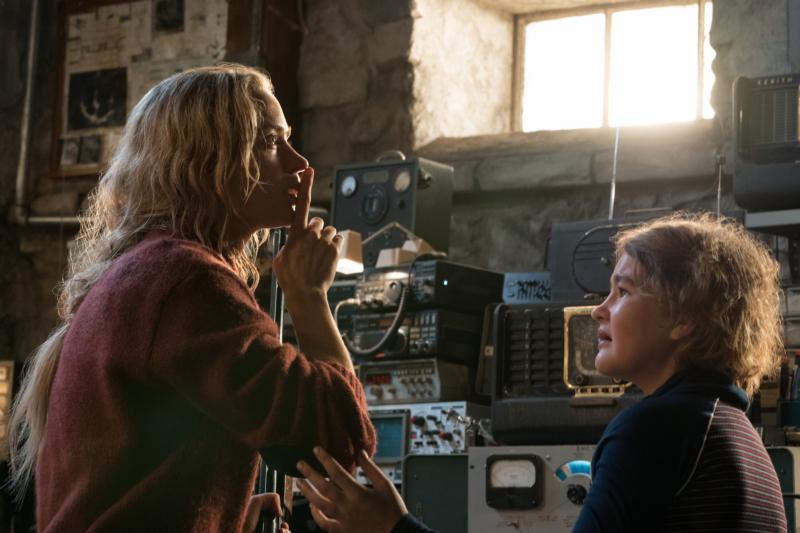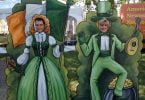
Emily Blunt and Millicent Simmonds star in a scene from the movie “A Quite Place.” The Catholic News Service classification is A-III — adults. The Motion Picture Association of America rating is PG-13 — parents strongly cautioned. Some material may be inappropriate for children under 13. (CNS photo/Paramount)
by Olivia Martin
olivia.martin@theleaven.org
“The most beautiful thing God made — so the Bible tells us — was the family. He created man and woman. And he gave them everything. He entrusted the world to them: ‘Grow, multiply, cultivate the earth, make it bear fruit, let it grow.’ All the love he put into that marvelous creation, he entrusted to a family.” — Pope Francis, address at the vigil prayer with families in Philadelphia, 2015
I don’t like horror films.
A few years ago, I had the pleasure of studying film in a course during college. Dr. Bowen, our professor, walked us through the history of film, its genres and techniques. We covered from sound to editing, Hitchcock to Tarantino, “Citizen Kane” to “The Shining.”
After watching selected films for class and countless since, I never expected to encounter — or even find — a film so human, so true or beautiful that it would make me cry despite my best efforts.
I most certainly did not expect to find it in a horror film.
Then I saw “A Quiet Place.”
The film closely follows the life of a family living on a farm in a recently post-apocalyptic version of America. They live quietly — extremely quietly — for even the slightest sound could summon an alien monster who would kill them on the spot.
The film is rich with excellent techniques and explores countless themes — from disability as a strength rather than weakness; acceptance and forgiveness; authority and obedience; the farm vs. the city; and the dignity of education.
Perhaps more interesting, however, is the way the film uses it’s “horror” genre to speak about what it means to be a family.
As per Catholic social teaching, the family is the foundation of society. When the family suffers and breaks, society follows.
But what happens to the family when society falls apart first?
“A Quiet Place” presents, I think, the best-case scenario.
Because of their experiences in the film, the Abbott family is representative of what it is to be a family — to be the family who is mourning the death of a member, the family whose society and culture has been all but erased, the family in a war-zone, the family who lives in an environment that is constantly trying to snuff it out.
Sure, we don’t live in post-apocalyptic America, but these experiences are ours as well.
So, on the level of suffering and loss, each of our families can relate to the Abbotts. However, along with the Abbotts, the story does not end there.
A key characteristic of the family in which we have especially been educated as Catholics is its foundation of unconditional love, a deep certitude that each member is a gift that irrevocably belongs to the others.
This is seen in the film in the way the Abbots are together. There is a surprising unity to their daily life. They fish together, pray and eat together, work together. The father brings protection, authority and structure and the mother gentleness, education and life. The children watch out for each other and openly share their insecurities and concerns.
The beauty the “horror” genre offers is precisely in the fact that it serves as a mirror — it is an aggressive and terrible darkness that serves as a contrast to the light of the Abbott family’s unity and hope.
This hope changed everything — and they were never without it.
It changed the way they fought the monsters — not to merely stay alive or because they necessarily feared death — but because there was something more important, something worth the fight.
They were fighting for the chance of a life together, which, as we viewers could see, is a good life.
This, indeed, is a premise of the film: life is a gift, no matter the circumstance.
The Abbott family understood that their life was good, regardless of humanity’s dwindling numbers, regardless of disability — the daughter, Regan, is deaf — regardless of the danger of giving birth and raising a child in a world where sound can be deadly, regardless of an uncertain future, precisely because it was full of love.
“A Quiet Place” has brought us a new awareness of the beauty of the family.
It is reminding us of the sanctity of the family. It is helping us understand the world we live in. It has helped me understand Tom Evans and Kate James’s fight for their son Alfie in the UK. It’s helping me understand my own family and myself.
Go see “A Quiet Place.”
And remember: Don’t make a sound.






